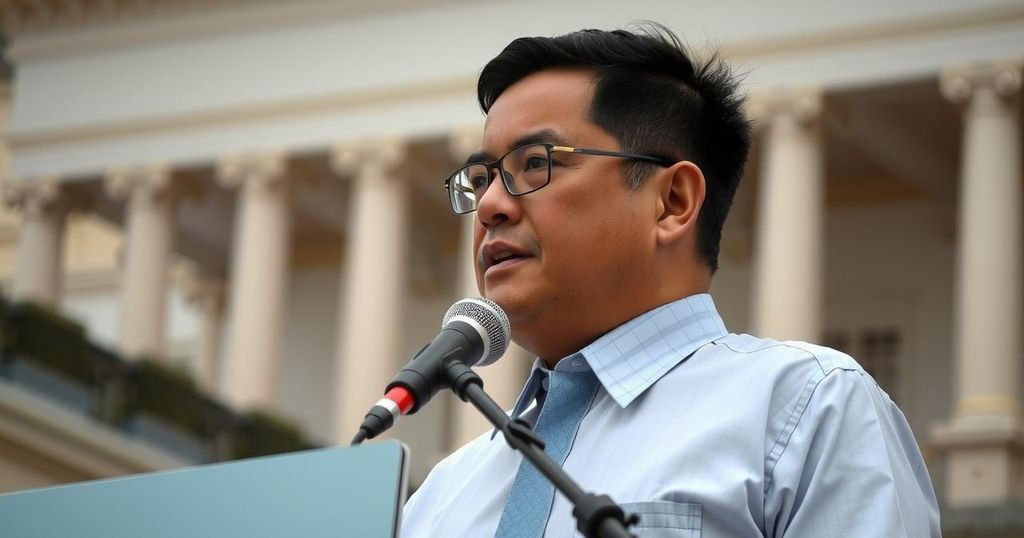Gustavo Petro’s Historic Pact is Colombia’s first government aimed at representing all citizens, yet it grapples with lawfare tactics, a conservative resurgence embodied by Alvaro Uribe, and significant challenges in upcoming elections. Efforts to consolidate power through a new unified party aim to protect smaller parties from elimination. However, Petro’s administration is stymied by Congress and ongoing violence, further compounded by U.S. scrutiny of his campaign financing, making the political climate increasingly complex ahead of the 2026 elections.
President Gustavo Petro’s administration, known as the Historic Pact, is historic for Colombia as it is the first government that aims to represent all Colombians. However, it faces significant challenges from entrenched interests such as large landowners, corporations, and narcotraffickers. Increasing pressures have emerged, including the rise of lawfare, a tactic used against progressive leaders in other Latin American countries, posing a threat to Petro’s plans for re-election in 2026.
As the Historic Pact seeks to consolidate its political power ahead of the elections, it has restructured itself, merging several smaller parties into a single entity to shield them from elimination due to new electoral laws. This newly formed Historic Pact Party aims to foster a broader alliance with various social movements. However, looming issues such as violence and unmet promises regarding social reform undermine its efforts to appeal to the Colombian electorate.
Under Petro’s leadership, the pursuit of the 2016 Peace Accord has faltered, evidenced by the alarming number of assassinations of social leaders and former combatants since the agreement. Furthermore, opposition from Congress has hindered the government’s ability to push through essential reforms, leading to failures in labor, healthcare, and education initiatives. In addition, Petro’s administration faces a backlash from lawfare tactics designed to obstruct and undermine its agenda, ranging from fines and legal murmurs aimed at discrediting the president himself.
The potential candidacy of former president Alvaro Uribe for the upcoming elections underscores the re-emergence of conservative politics in Colombia. Uribe, notorious for his militaristic approach to internal conflict, has positioned himself as a counterbalance to Petro’s progressive agenda, especially amidst public apprehension concerning security. Concurrently, the influence of U.S. interests in Colombia remains significant, as American political leaders scrutinize Petro’s administration, coinciding with allegations of misconduct surrounding his campaign financing.
In summary, President Petro confronts mounting challenges from established power structures, including lawfare and a conservative resurgence, which threaten his government’s objectives. The upcoming electoral cycle will be critical for Petro’s administration as it attempts to navigate these tumultuous political waters while pursuing its reform agenda and maintaining stability in a divided nation.
The article discusses the leadership of President Gustavo Petro and the issues surrounding his Historic Pact government, which aims to unite Colombia’s diverse populace. It highlights the obstacles Petro faces, particularly from lawfare—tactics designed to delegitimize his administration—and the returning political influence of former president Alvaro Uribe. Additionally, it reflects on the implications of U.S. involvement in Colombia’s domestic politics and the broader context of the historical struggles between progressive and conservative forces in the country.
In conclusion, President Gustavo Petro’s Historic Pact government is besieged by significant challenges, ranging from internal opposition and reform failures to the intricacies of lawfare. As the 2026 elections approach, the re-emergence of conservative candidates like Alvaro Uribe may further complicate Petro’s efforts to secure a legacy of social reform in a fragile political landscape marked by violence and instability. The United States’ vested interest in Colombian matters reflects the geopolitical stakes involved as Petro’s administration strives to maintain its progressive agenda amidst growing adversities.
Original Source: peoplesworld.org





